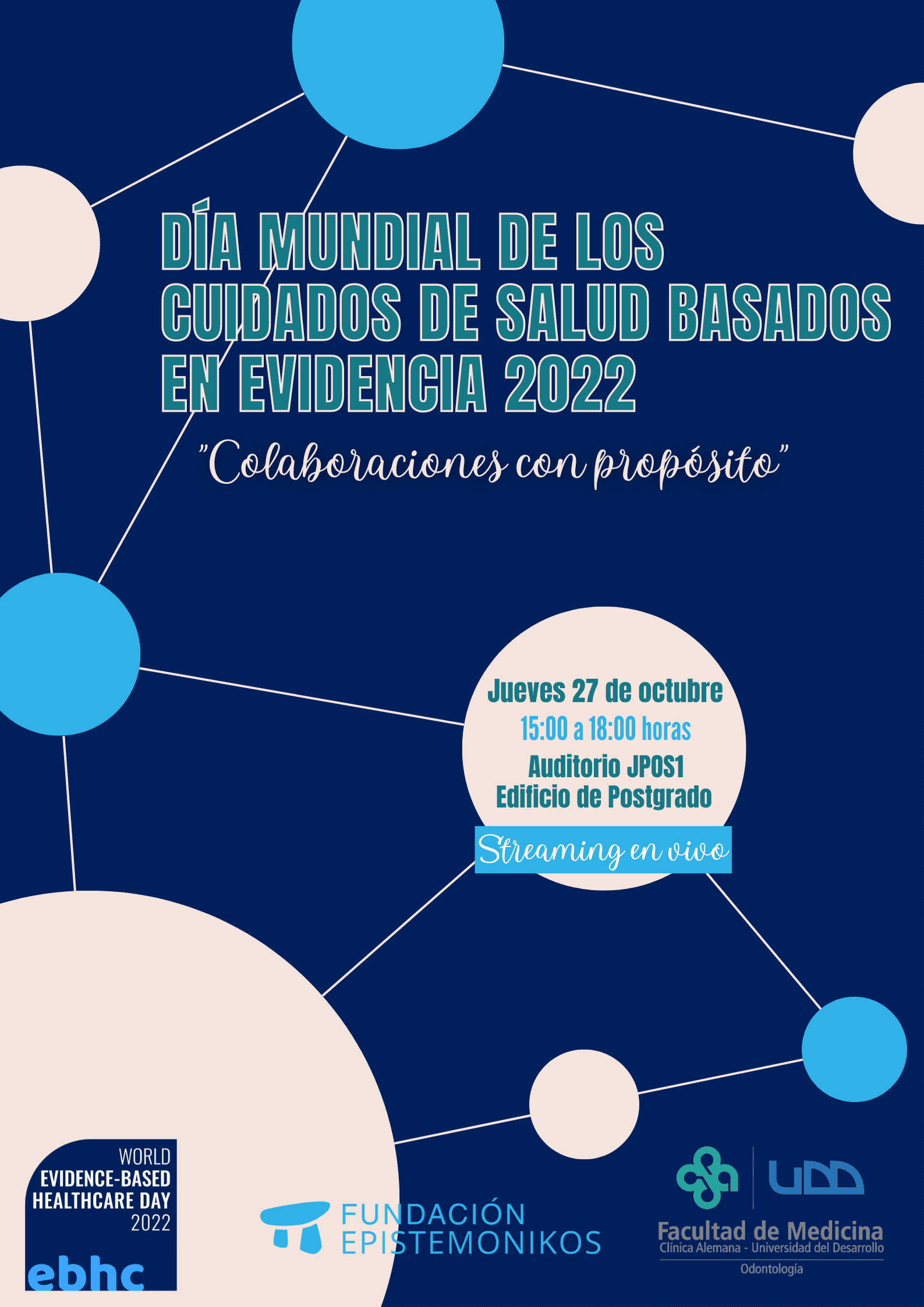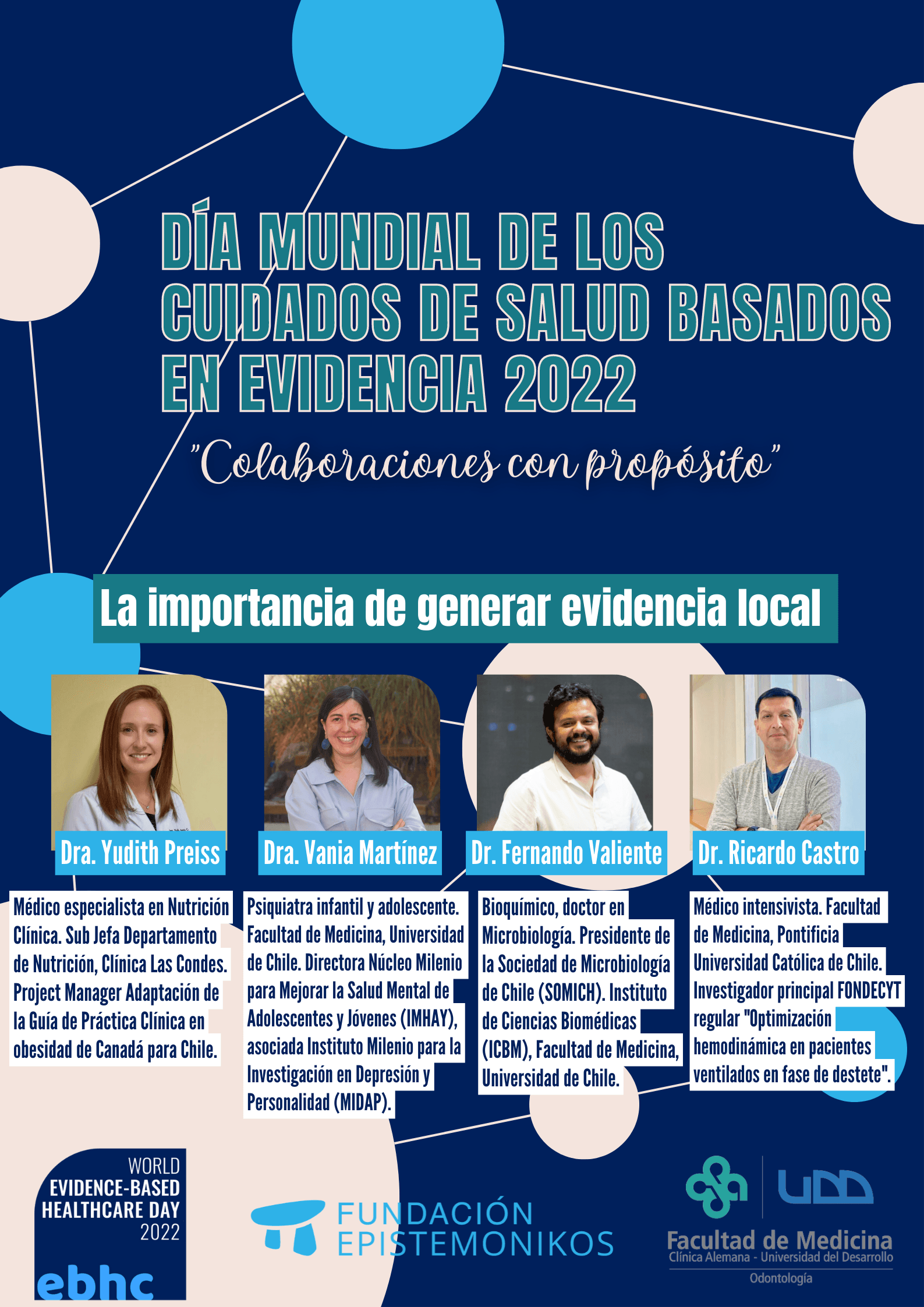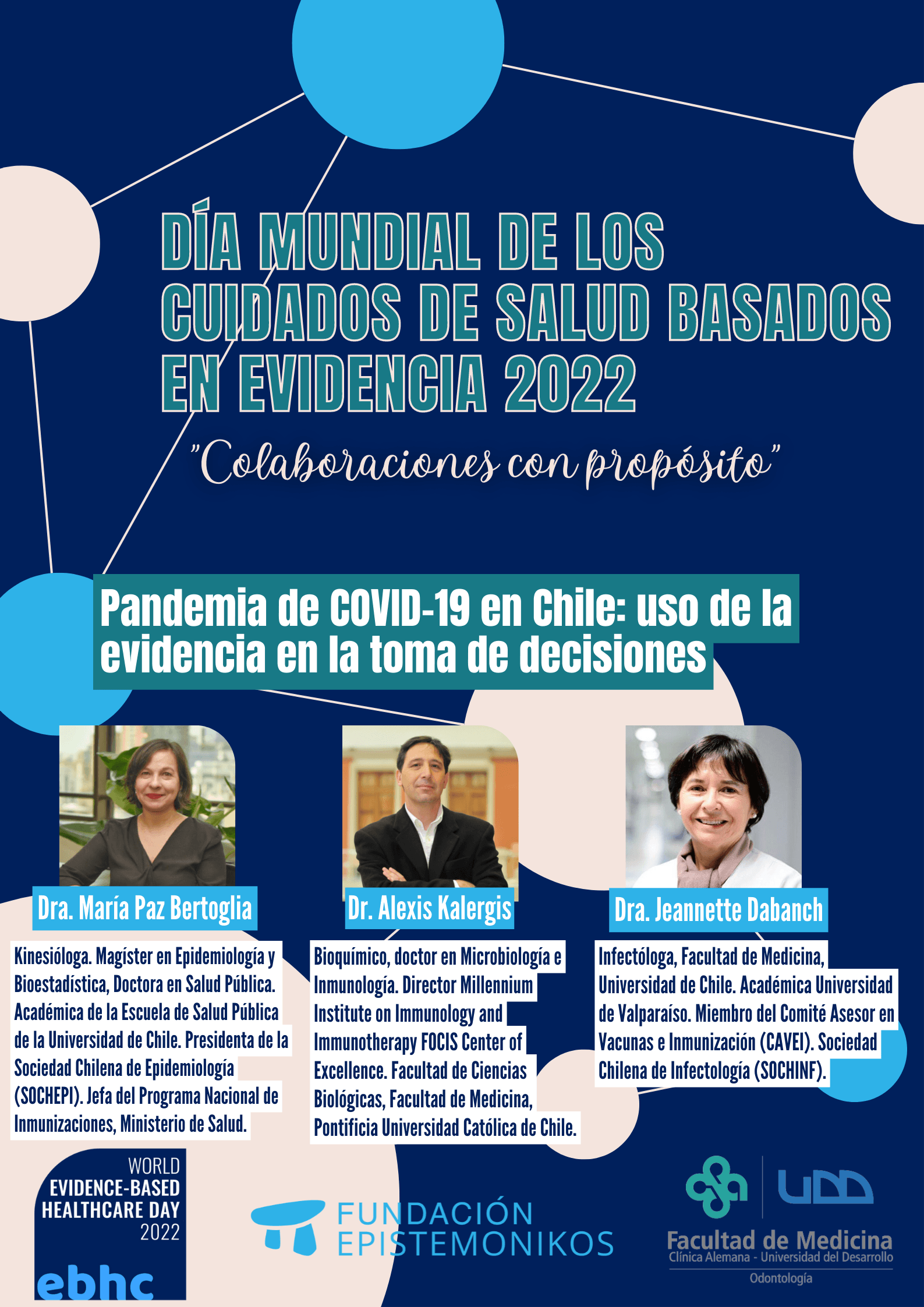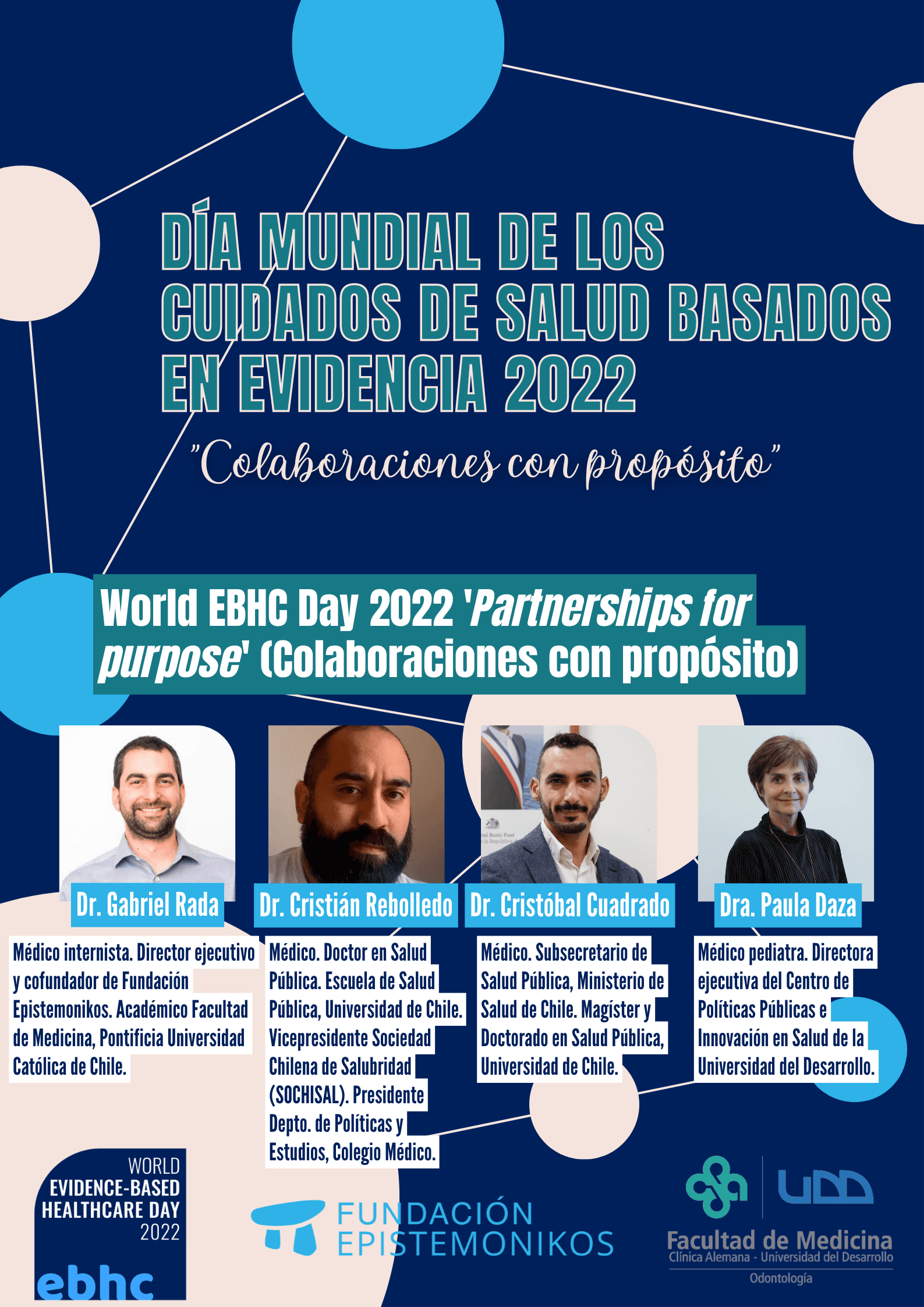
The commemoration of this date is coordinated by international organizations based in Europe, North America, Oceania, and Africa. 2022 marks the first year that an event is being organized in Chile.

20|OCTOBER|2022
For the first time in Chile: World Evidence-Based Healthcare Day 2022
The commemoration of this date is coordinated by international organizations based in Europe, North America, Oceania, and Africa. 2022 marks the first year that an event is being organized in Chile.
The global initiative aims to raise awareness about the need to inform the development of public policies, clinical practice, and healthcare decision-making based on the best available evidence.
The practice of Evidence-Based Healthcare, also known as Evidence-Based Medicine, has solidified in the last 30 years. It is virtually indisputable today that clinical practice, the development of public health policies, and healthcare decision-making in general should be guided by a body of evidence from rigorous research. This is becoming increasingly necessary as healthcare challenges grow, and patients are more exposed to the rapid spread of misinformation. Additionally, evidence can guide healthcare investment decisions and inform scientific research.
In 2020, the World Evidence-Based Healthcare Day was established to create awareness about the need to base healthcare decision-making on the best available evidence. Since its first edition, this event has been commemorated annually worldwide on October 20.
Epistemonikos Foundation is an #EvidenceAmbassador for this year's edition.
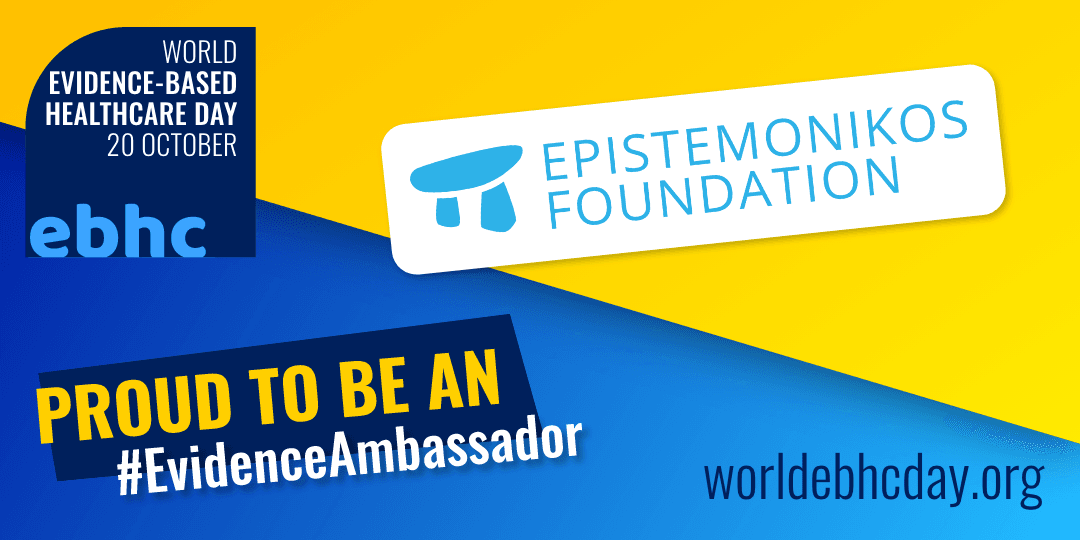
First time in Chile
The commemoration of this date is coordinated by international organizations based in Europe, North America, Oceania, and Africa. This year marks the first time that an event is being organized in Chile. The initiative was born from the Epistemonikos Foundation, a non-profit organization that was established in Chile ten years ago with a mission to promote access to the best evidence for healthcare decision-making. The Epistemonikos Foundation has developed various tools to assist in evidence synthesis and use in healthcare, including the world's largest health evidence repository and the L.OVE Platform. At the national level, the Epistemonikos Foundation has participated in various projects with the Ministry of Health of Chile, the Chilean Medical Association, and medical and scientific societies.
The 'World Evidence-Based Healthcare Day 2022 in Chile', organized with the support of the Faculty of Medicine of Clínica Alemana Universidad del Desarrollo, will take place on Thursday, October 27, from 3:00 PM to 6:00 PM, at the JPOS1 Auditorium in the Postgraduate Building on the Rector Ernesto Silva Bafalluy Campus of Universidad del Desarrollo (Av. Plaza 680, Las Condes, Santiago de Chile).
Program
The event in Chile for the World Evidence-Based Healthcare Day 2022 will feature representatives from leading institutions working in the generation, synthesis, and implementation of evidence for decision-making and the development of public health policies.
The Importance of Generating Local Evidence
The Evidence-informed Policy Network (EVIPNet) of the World Health Organization (WHO) has released a document for the post-pandemic era, calling on intergovernmental organizations and regional and national institutions to establish and maintain open repositories of health evidence. The call extends to the development of high-quality evidence syntheses and clinical guidelines that are relevant, timely, and easily adaptable to the local context.
This panel discussion will feature Dr. Yudith Preiss, a member of the Chilean Society of Bariatric and Metabolic Surgery, Deputy Head of the Nutrition Department at Clínica Las Condes, and the project manager for adapting the obesity clinical practice guideline for Chile based on the Obesity Canada guideline. Also participating will be Dr. Vania Martinez, Director of the Milenium Nucleus to Improve Mental Health in Adolescents and Young People (IMHAY), Associate Researcher at the Milenium Institute for Research in Depression and Personality (MIDAP), and a faculty member of the Faculty of Medicine at the University of Chile. Dr. Fernando Valiente, President of the Chilean Society of Microbiology (SOMICH) and a researcher at the Institute of Biomedical Sciences (ICBM) at the University of Chile, and Dr. Ricardo Castro, an intensive care physician at the School of Medicine of the Pontifical Catholic University of Chile and the principal investigator of the regular FONDECYT project "Hemodynamic Optimization in Ventilated Patients during Weaning", will also be part of this discussion.
Use of Evidence in the COVID-19 Pandemic
With more than two years of the COVID-19 pandemic behind us, it is the opportune moment to solidify the lessons learned and lay the groundwork for future health emergencies and more structural changes in the mechanisms of using evidence and information for healthcare decision-making.
This panel discussion will feature Dr. María Paz Bertoglia, Head of the Immunizations Department at the Ministry of Health, Dr. Alexis Kalergis, Director of the Milenium Institute of Immunology and Immunotherapy and a faculty member at the Pontifical Catholic University of Chile, and Dr. Jeannette Dabanch, a faculty member at the Faculty of Medicine of the University of Chile and the University of Valparaíso, a member of the Chilean Society of Infectious Diseases (SOCHINF), and the Advisory Committee on Vaccines and Immunization Strategies (CAVEI).
Collaborations with Purpose
This year's World Evidence-Based Healthvare Day theme, 'Collaborations with Purpose' seeks to highlight partnerships within the evidence-based medicine ecosystem that have contributed to accelerating innovation, maximizing impact, and overcoming the challenges of using and transferring evidence into healthcare.
The COVID-19 pandemic spurred an unprecedented amount of national and international collaborations among regulators, governments, researchers, healthcare providers, technology companies, and consumers. It has been estimated that the implementation of biomedical evidence in patient care takes an average of 17 years, so the ability to develop rapid evidence-based responses and ensure that the best evidence is accessible in an understandable and transparent manner were among the most valuable lessons from the pandemic.
The call to action from the WHO's EVIPNet emphasizes interdisciplinary and intersectoral collaborations considering that health is influenced by multiple factors. It highlights the need to strengthen collaborative initiatives, create institutional structures and processes for transparent and timely research and data integration, and calls on governments and intergovernmental organizations to ensure sustainable funding and incentives for evidence-informed decision-making activities.
This panel discussion will include Dr. Gabriel Rada, Director of the Epistemonikos Foundation and a faculty member at the Faculty of Medicine of the Pontifical Catholic University of Chile, Dr. Cristián Rebolledo, Head of the Program for Health Policies, Systems, and Management at the School of Public Health of the University of Chile and Head of the Department of Policies and Studies at the Chilean Medical College, Dr. Cristóbal Cuadrado, Undersecretary of Public Health at the Ministry of Health of Chile, and Dr. Paula Daza, Executive Director of the Center for Public Policies and Innovation in Health at Universidad del Desarrollo.
